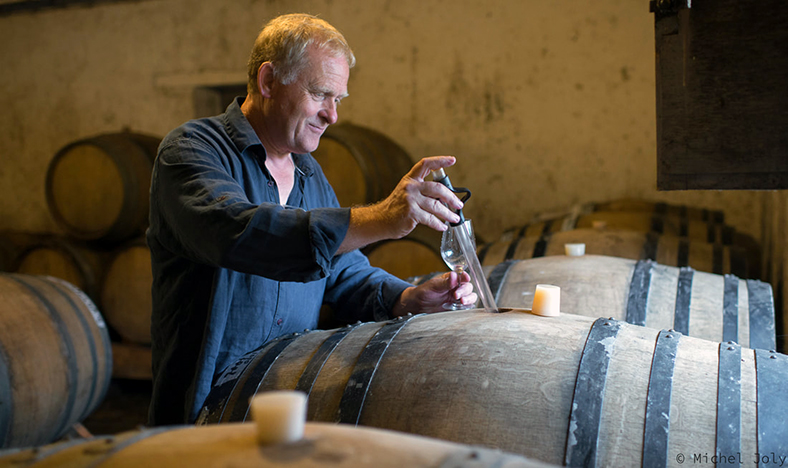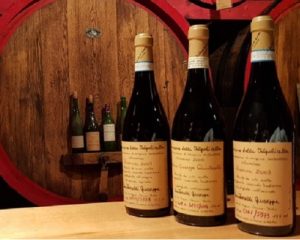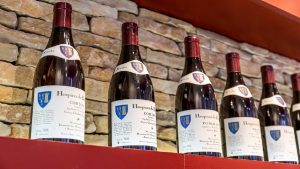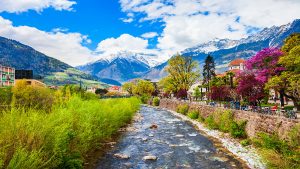
Located at the heart of Anjou noir, this is a family estate currently run by Patrick Baudouin who took over in 1990. A long process of questioning and self-reflection has led to the crafting of top-quality wines. This is also a vintner engaged in the promotion of his region’s fine terroirs, as well as the place of the Chenin grape in Anjou.
Renaissance of a family domain
Located in Chaudefonds-sur-Layon, south of Angers, Domaine Patrick Baudouin was founded back in 1920 by the great-grandparents of the current owner. It was in 1990 that Patrick decided to return to his home after trying several career paths, including owning a bookshop in Paris. At that time, however, the land had been left to its own devices, with vines covering just a couple of hectares. It took more than a bit of work to restructure the estate and expand its vineyards, and it now proudly spans 13.5 hectares, all shared across the communes of St Aubin-de-Luigné, Ardenay, Chaudefonds-sur-Layon, Rochefort-sur-Loire and Savennières.
All in all, 80% of the vines are Chenin grapes, and the remaining 20% is for the cultivation of Cabernet Franc. Actions, indeed, speak louder than words, and this share of grape varietals shows Patrick’s eagerness to promote Chenin in the Anjou region. “In the past, it was widely known that Chenin was the right varietal for Anjou so it was the dominant one, but now it represents just 20% of the region’s vines. There is a lot of Cabernet Franc these days for making reds and rosés,” he explains. With this history in mind, Patrick had set out to understand this historic grape and its value in the region’ terroirs.
The domain is largely located on slopes and enjoys a real variety of Anjou noir’s terroirs. There is a wonderful geological complexity here, with soils rich in schist, sandstone, and volcanic rock.
Questioning standard methods
In his early days at the domain, Patrick followed regional winemaking traditions, keeping to the most common working methods of the time, meaning that he essentially produced dessert wines using chaptalisation. However, he quickly came to question this way of doing things. He undertook much research, trying to really get a grasp of the regional landscape and its alternative potential. By the end of the 1990s, he had completely moved away from chaptalisation. This meant he had to confront the problem of irregularity in dessert wine production, as he was now relying solely on the successful ‘noble rotting’ of the grapes without recourse to added sugar (chaptalisation). To balance out this year-to-year uncertainty, which sometimes made producing dessert wines impossible depending on the climate, Patrick expanded his repertoire into dry Chenin wine. ‘This is once of the strengths of Chenin, how easily it makes both dry and sweet wines. I’m not against dessert wines at all, I produce it myself when I can, but I take only what nature offers,’ he details. The domain now produces 80% dry whites, topped up by some red and desert cuvées when the season is propitious. ‘In the past six years, four of them have brought severe frost affecting 40-60% of the grapes. Since waiting for the grapes to develop botrytis is an extra risk, it’s not a decision we take lightly!’
It’s interesting to note that today, chaptalisation is actually forbidden in the region, a move that has drastically reduced the volume of dessert wines produced.
Organic produce and Anjou terroirs
The vineyards of this domain are all cultivated organically, certification having been obtained in 2005. A lot of manual labour is required, and the estate employs around one worker for every two hectares, quite a rare number in the region.
Rational in their approach, very small amounts of sulphur and copper are used on the plants, and animals are brought in to work the soil. A tractor will sometimes be used to help out, though, as ‘our soils aren’t simple here, they dry out and get hard very quickly and slope quite steeply’. The team is very interested in the microbiology of the earth and thus receive training on the subject. Pushing the question of biodynamics, Patrick expresses having no interest in this trend, comparing it to a kind of occultism. Nor is he taken by the natural wine movement: for this vintner, it’s people who make wine, and they have to take all the necessary precautions for a wine to be well preserved and properly enjoyed.
To conclude, Patrick Baudouin has reconfirmed his disappointment that the beautiful terroirs of Anjou and the fine wine they produce don’t get more attention. He wants his neighbouring vintners to live well off their work, which is not always the case at present due to high production costs in the region. From this stems his active fight for more recognition in the form of appellations, as this would allow more of the region’s wines to join the circle of France’s finest. We support him in his passionate endeavour, being just as convinced that these cuvées are more than deserving of a little more limelight.
Find all the wines from Domaine Patrick Baudouin available here



